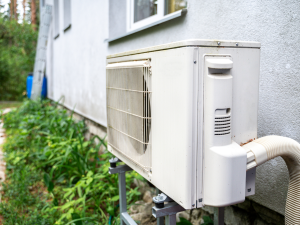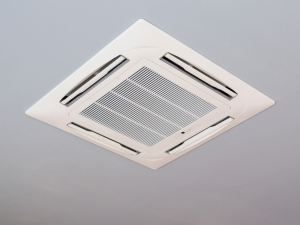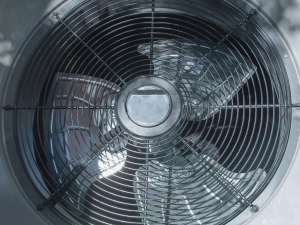The fact that an air conditioner can freeze up in the middle of a scorching summer means that homeowners may want to be proactive. Unfortunately, not many homeowners have an understanding of why this happens and how to prevent it.
But before we jump into the reasons and their corresponding solutions, how do you tell your AC is freezing up? Well, seeing a chunk of ice sitting on top of your AC is a sure sign. However, it’s not always that obvious. Sometimes, not getting cold air in the house is the only sign you will get. When this happens, check the supply register to see if it’s warm.
That is a clear indicator that your AC’s evaporator coils are frozen. You can also open the panel and check inside for ice. More often than not, you will see specs of ice on the components, especially the coils. You may also want to contact an AC professional technician.
How Does AC Make Cold Air?
To understand how and why an AC unit is freezing up, you need to grasp how the unit works. It all starts and stops with the evaporator coils. This vital AC component is full of cold refrigerant. Once activated, the coils need warm air to blow over them and keep the refrigerant’s temperature stable enough that it doesn’t cause freezing.
The indoor coil of an AC takes the heat from your house and transfers it to the outdoor coil using the refrigerant before pushing it outside. It also sucks the humidity from your home and moves it outside via the condensate line. Once that is done, the fan blows the cool, fresh air back to the house. All these processes require a clear passageway to allow for adequate airflow.
Unfortunately, if one component of the AC malfunctions, the entire system is disrupted. For example, if something is blocking the warm air from flowing over the coils, this can cause the refrigerant to cool too much and cause freezing.
What Causes AC to Freeze Up?
As noted above, the evaporator coils are the main culprit when the AC freezes. Here are three reasons why those coils could be malfunctioning.
1. Lack of Airflow
The biggest reason why your AC could freeze up is a lack of adequate airflow. Warm air is not coming in, which means cold air can’t get out either. This can be caused by several factors, including the following:
• Clogged Air Filter
It’s common for an AC system to malfunction because of a clogged air filter. This filter sits between your dusty vent and the AC, keeping dirt, pollen, and other unwanted debris from getting into your AC.
With time, the filter collects too much dirt and gets clogged. This means air cannot pass through anymore, and there is no warm air going over the evaporator coil. As a result, the refrigerant cools too much, and freezing happens. Changing or cleaning the filter every month goes a long way toward preventing this problem.
• Blocked Air Ducts
Air ducts are a passageway for air to move through the house to and from the AC. Naturally, if anything blocks the air ducts, the air stops flowing correctly, and freezing occurs, as is the case with a dirty filter.
Two things can block the air ducts: dirt or collapse. While clogging can be sorted with some cleaning, collapsed air ducts need to be restored by a professional.
• Blocked or Bent Condenser Fins
The condenser unit walls contain metal fins, which need regular cleaning to keep the airflow going. Sometimes, these fins can also bend and obstruct airflow. You can prevent this by hosing the dust and other debris away or placing the fins back properly if bent.
• Faulty Fan
The fan’s sole purpose is to move air between the house and the AC. Therefore, if the fan is not functioning properly, airflow will be disrupted, and condensation will occur.
2. Low Refrigerant
The level of refrigerant inside the coils affects AC pressure. The more refrigerant you have, the higher the pressure, which means warm air can be converted and pumped back to the house as cold air.
However, when the refrigerant is too low, the coils cool down too fast and cause moisture to condense before it’s kicked out of the system. The level of refrigerant can deplete with years of usage or because of a leak. It’s therefore important to schedule regular maintenance of the AC unit to ensure everything is okay.
3. Blocked Condensate Line
The condensate unit is a pipe that takes the moisture siphoned from your home outside. Unfortunately, this pipe can gather dirt and sludge with time like any other AC component. If neglected for too long, it becomes blocked and unable to move water out. This means the water stays inside the AC and freezes on the coils. Regular cleaning of this pipe can prevent this issue.
What Do You Do When Your AC Unit Freezes Up Inside?
So, you have discovered that your AC is freezing up because of one of the issues mentioned above. What next?
- Turn off the AC. We recommend you shut off the power from the circuit breaker in addition to turning off the thermostat. Using the AC when it’s frozen can cause more harm to the components and can even lead to the unit shutting down completely. Let it stay off for a day or so until all the ice thaws.
- Let it dry. Once the ice thaws, it’s time to dry the unit. You can use an air dryer to speed up the process or turn on the AC fan only. This will dry even the hard-to-reach places and prevent mold or rust.
- Call a professional. Unless you are an air conditioner expert, you should call a professional to fix the issue. Besides changing filters and cleaning the parts, a professional will also check for things you wouldn’t think of.
As common as it is, air conditioner freezing up is a sign of a bigger issue that needs to be sorted. Thankfully, it’s something that a professional can take care of in an hour or so. To prevent such an issue, regular preventative maintenance and tune-ups are necessary. This includes changing filters, cleaning the components, and checking for any leakages.




